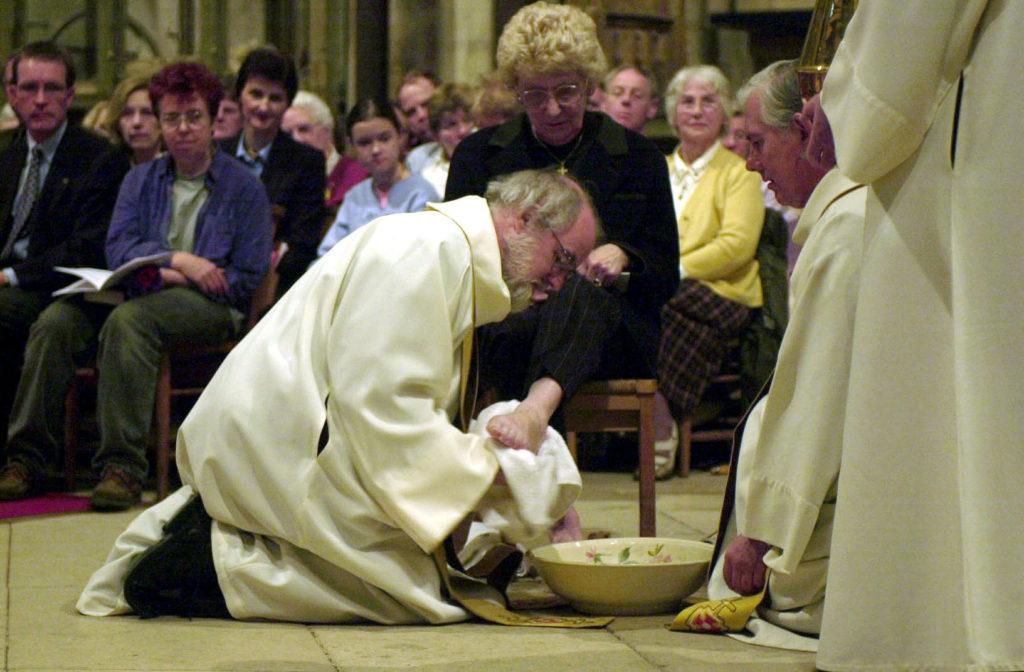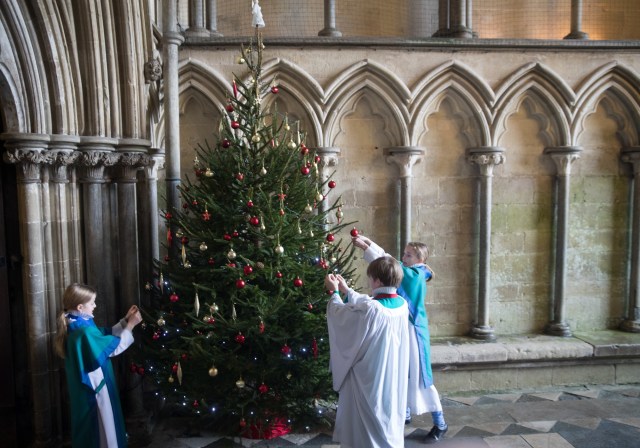Choristers from the Salisbury Cathedral Choir make final preparations for Christmas (Photo by Matt Cardy/Getty Images)

This is, you’d have thought, the high point of the year in terms of brand recognition for the Christian faith. “Christ’s Mass” is precisely what “Christmas” derives from – and even the determinedly Godless will at some point have had Mary’s Boy Child played at them somewhere in the last few days (in my case, by itinerant Filipino carol singers on the bus), with its impeccably orthodox payoff; “and man will live for evermore/because of Christmas Day”.
Or, for the middle classes, end of year carol services involve exposure to the plain exposition of the doctrine of the Incarnation: “Veiled in flesh the Godhead see/Hail th’Incarnate Deity” … that’s Hark the Herald Angels for you. One Evening Standard columnist, Ayesha Hazarika – a Muslim by background and, of course, an UnHerdian – observed this week that going to a carol service (candle-lit) should be practically obligatory as a seasonal activity; she almost cried during the last verse of O Come All Ye Faithful (presumably the dynamite climax: “God of God, Light of Light”). No other belief system has this kind of cultural underpinning.
And yet, it’s not working. Three years ago, YouGov did a survey of beliefs about the Christmas story and it seemed a majority of people (55%) thought that Jesus was not born to a virgin mother, compared to 24% who thought he was. 18% did not believe Jesus Christ actually lived at all. A few days ago The Independent published research suggesting that one in five Brits did not realise that Christ was born on Christmas Day. And, yes, I do realise that the date of Christmas was only fixed in the fourth century; this is still really weird.
But the detachment from religion goes further. This was the year in which the National Centre for Social Research revealed that 53% of Britons regard themselves as having “no religion” – and in the case of 18-25 year olds the proportion rose to 71%. Only 18% identified as a member of the Established Church, of England. This is getting to Scandinavian levels of unbelief – in Sweden only about 18% of people are actually Christian.
Yet, godless Brits buck a global trend: in the world as a whole some 85% of people do identify with a faith, a proportion that seems likely to increase. Which was one reason why the BBC declared that, following a survey of its religious coverage, it would be devoting more, not less, time to religious programming. Religion, declared the BBC head of radio and religion, James Purnell, is indispensable to understanding “who we are, how to live well…we need to understand where we’ve come from. We can’t understand Britain without reference to belief.” So the Corporation would take religion more seriously, not least by including references to non-Christian festivals: Muslim Eid, Hindu Diwali, and so on.
Mr Purnell is an atheist, but it’s not the point. We need a better class of atheist: someone like Richard Dawkins, who happens to be an enthusiast for the King James Bible.
My own experience of religious broadcasting is dispiriting. It usually involves being asked to participate in some Sunday discussion about sexuality: Do I worry about children being taught about transgender issues? How did I feel about gay marriage? It’s as if Christians are in the habit of reciting our views on sexual relations in church rather than a creed that features the resurrection of the dead and life everlasting. It’s a dispiriting and reductionist view of religion.
What’s missing is the reflexive knowledge of Christianity that previous generations absorbed almost by osmosis, even if they don’t actually believe. As Stephen Bullivant, who teaches theology to student teachers at the Catholic St Mary’s University in Twickenham observed:
“When I was at school, I wasn’t in any sense Christian, but I had a straight nativity play, said the Lord’s Prayer and sang Christian hymns. My mother like the rest of her generation, had scripture classes. My students, who often come from Catholic schools, simply don’t have the infrastructure of basic knowledge…the knowledge of the books of the New Testament, the century in which Christ was born, that sort of thing”.
By way of remedy, he provides a crash course in basic Christianity which gives as much doctrine as needed to understand the parameters of the faith.
The problem is evident everwhere. At Cambridge, students are offered a crash course in Christian doctrine so as to understand the religious allusions in their texts – and it’s impossible to read English literature, secular as well as overtly religious, without being aware of the Christian element of the national mindset. Rowan Williams, the previous Archbishop of Canterbury’s book, addressed this more generally in his book, Lost Icons. When we lose the basic Christian story, we lose the glue of much of our civilisation.

One director of studies in history at Cambridge drily observes that he often has to explain the basics to his students: like what baptism is. Students should, of course, have been taught this at school, but, as he says:
“All they emerge with, if anything, seems to be some vague sense that the calendar is full of unaccountable religious festivals that are all in some way the same, together with a confused notion that religions manage on the one hand to agree on a slate of fundamental moral principles while at the same time provoking people to horrific criminal excesses. Students from religious schools often know rather more, but even that cannot be guaranteed.”
I know colleagues in English and History routinely have to explain aspects of Christian faith and practice in order to help students understand texts and events that, a couple of generations ago, would have seemed self-evident even to agnostics.”
And that’s the problem: not just a lack of faith but a lack of simple knowledge.
Of course the churches are fighting back. John Bingham, CofE spokesman, says that cathedrals, a surprisingly vibrant point of intersection between religion and secular society, are doing their best to equip un-knowing visitors with some of the rudiments of Christianity. So, for instance, York Minster explains the eucharist on its website thus:
“The Eucharist, also called Holy Communion or The Lord’s Supper, is offered once or twice every day, using both contemporary and traditional forms. Taking bread and wine, using the example of Jesus Christ on the night before he died, Christians remember Christ’s death on the cross and determine to make a new community, demonstrating the love of Christ which was his ‘new commandment’ to his followers.”
Bingham also points out that clergy now “are now being trained on the assumption that knowledge of the Christian faith is far less widespread and should no longer be presumed as part of a shared culture. Their training now stresses the need to work intelligently and respectfully in communities where there is a range of different religious commitments. In many cases local clergy are at the forefront of work to create better understanding between faiths and to develop the kind of literacy which helps mutual understanding and social cohesion.”
There are other measures too, like Councils of Faith, in which clergy give advice to local authorities – Oxford Council is one example – on matters of religion.
It’s all useful work. It’s all needful. But this kind of remedial measure wouldn’t be necessary, if there were simply more Christians about who took their faith for granted and were present in local authorities or the BBC or universities. That’s the real problem: not a dearth of special measures, but a dearth of Christians in public life.
And a Happy Christmas to you.









Join the discussion
Join like minded readers that support our journalism by becoming a paid subscriber
To join the discussion in the comments, become a paid subscriber.
Join like minded readers that support our journalism, read unlimited articles and enjoy other subscriber-only benefits.
Subscribe